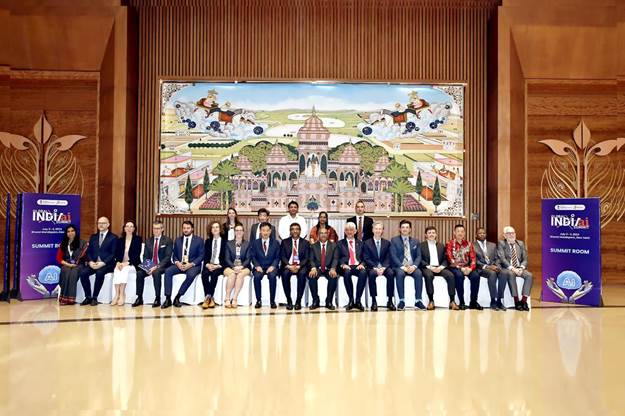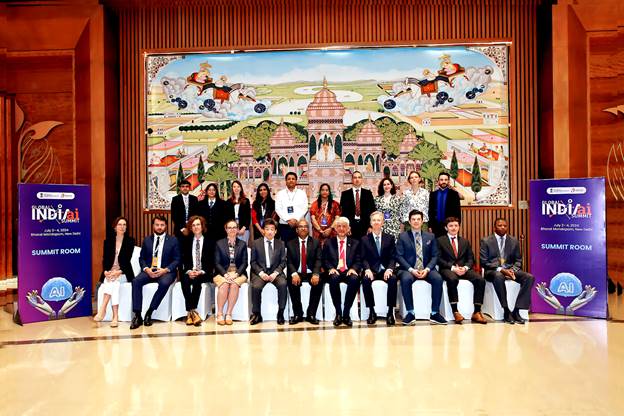
The 6th meeting of the GPAI Ministerial Council was held on 3rd July 2024 at Bharat Mandapam, New Delhi in a hybrid mode. The meeting was chaired by Hon’ble Minister of State Electronics and Information Technology and Commerce & Industry, Shri Jitin Prasada. Hon’ble Vice Minister from the Outgoing Chair, Japan Shri Hiroshi Yoshida and Hon’ble Minister from the Incoming Chair, Serbia, Ms Jelena Begovic also addressed the meeting. The meeting was also attended by Jerry Sheehan, Director, Science Technology & Innovation from OECD and Dr Tawfik Jelassi, Assistant Director General from UNESCO also attended the meeting.


After extensive discussions and deliberations, the members came to a consensus about the future vision of Global Partnership on Artificial Intelligence (GPAI). The key points included in the future vision are as under:
1. Recognise the transformative potential of artificial intelligence (AI) in shaping the future of our societies and economies, the opportunities that safe, secure and trustworthy AI systems represent to accelerate and enable progress towards the achievement of sustainable development, and the importance of coordinated international efforts towards harnessing the benefits of AI;
2. Acknowledge the emerging risks and challenges posed by AI systems, particularly advanced AI systems, including those related to safety and security and potential malicious uses; mis and disinformation; harmful biases leading to discrimination; lack of transparency and fairness; lack of level playing field; risks to intellectual property and personal data protection; threats to human rights and the wellbeing of children; risks for environmental sustainability and democratic values; widening digital divides between and within countries; and transforming the future of work;
3. Share a commitment to fostering trustworthy and human-centric AI through an inclusive, multi-stakeholder approach relying on a strong scientific basis, open solutions and common standards, and to strengthening cooperation between governments, academia, researchers, technical community, private sector, and civil society, including from developing and developed economies to this end;
4. Reaffirm our collective commitment to the OECD Recommendation on Artificial Intelligence and the UNESCO Recommendation on the Ethics of AI;
5. Recall that the Global Partnership on Artificial Intelligence has, since its launch, been a unique initiative for global multi stakeholder cooperation on AI;
6. Recognise the New Delhi 2023 GPAI Ministerial Declaration, where we stated our dedication to strengthening GPAI’s unique and independent identity as a nodal initiative that plays a key role in global cooperation on AI innovation and governance; and reaffirm our commitment to pursuing a diverse membership, with a particular focus on low and middle-income countries to ensure a broad range of expertise, national and regional views and experiences based on our shared values;
7. Note the collective contribution of the ‘Small Working Group for Future of GPAI’, the GPAI Secretariat and the Executive Council towards conceptualizing the future of GPAI and its governance and operational modalities.
8. Acknowledge OECD’s continued support to GPAI since its inception and reaffirm our shared commitment to strengthen synergies between GPAI and OECD for the advancement of human-centric, safe, secure, and trustworthy AI;
9. Announce a renewed vision for GPAI through an integrated partnership with the OECD bringing together all current OECD members and GPAI countries on equal footing, under the GPAI brand and on the basis of the OECD Recommendation on Artificial Intelligence;
10. Call on countries, regardless of their current membership status in the GPAI or OECD, to join us in this collaborative endeavor to harness the potential of human-centric, safe, secure, and trustworthy AI for the good of all;
11. Look forward to working with relevant international organizations and United Nations Specialized Agencies and with other partners through an inclusive dialogue, on an ad hoc basis;
12. Emphasise that members of the integrated partnership will welcome by consensus on the admission of new members and observers, as well as on work priorities of the partnership;
13. Underscore that all members of the integrated partnership will participate equally, without distinction or disparities, in the partnership’s activities and its decision-making;
14. Affirm our commitment to ensure inclusive governance at all levels of the integrated partnership through the Council, Plenary, and Steering Group as the governing bodies of the partnership;
15. Commit to retaining and strengthening GPAI’s multi stakeholder nature and enhancing member-expert collaboration, including through the active role of GPAI Expert Support Centres (ESCs) and through merging GPAI Multistakeholder Expert Group (MEG) and OECD Network of Experts on AI (ONE AI) and their existing expert/working groups into a single expert community of the partnership;
16. Note that the integrated partnership may consider the development of its specific working methods, through consensus, based on the equal footing of all members irrespective of their OECD membership status;
17. Consider the important role of the integrated partnership and international cooperation in bridging the digital divides within and between countries, promoting safe, secure and trustworthy AI, and promoting synergies with AI initiatives launched in other international fora such as G20 and G7, including the Hiroshima AI Process, the Council of Europe, the 2023 Bletchley Park AI Safety Summit, the 2024 AI Seoul Summit and the upcoming 2025 France AI Action Summit;
18. Affirm our goal to continue engaging in constructive dialogue through the integrated partnership to achieve our shared vision of a future where AI is used for the good of all, leaving no one behind and promoting peace, prosperity, and sustainable development;
19. Welcome the election by GPAI members of Serbia as Lead Chair of GPAI for 2024-25 and look forward to the GPAI Summit in Serbia later this year.
The 2024 GPAI New Delhi meeting and the consensus reached on the future of GPAI underscores India’s leadership in the global AI discourse, cementing its pivotal role in steering the ethical and inclusive development of AI.
This will pave the way for the renewed integrated partnership to achieve its objectives of harnessing the potential of AI for Good and for All.
*****
YB/KS



